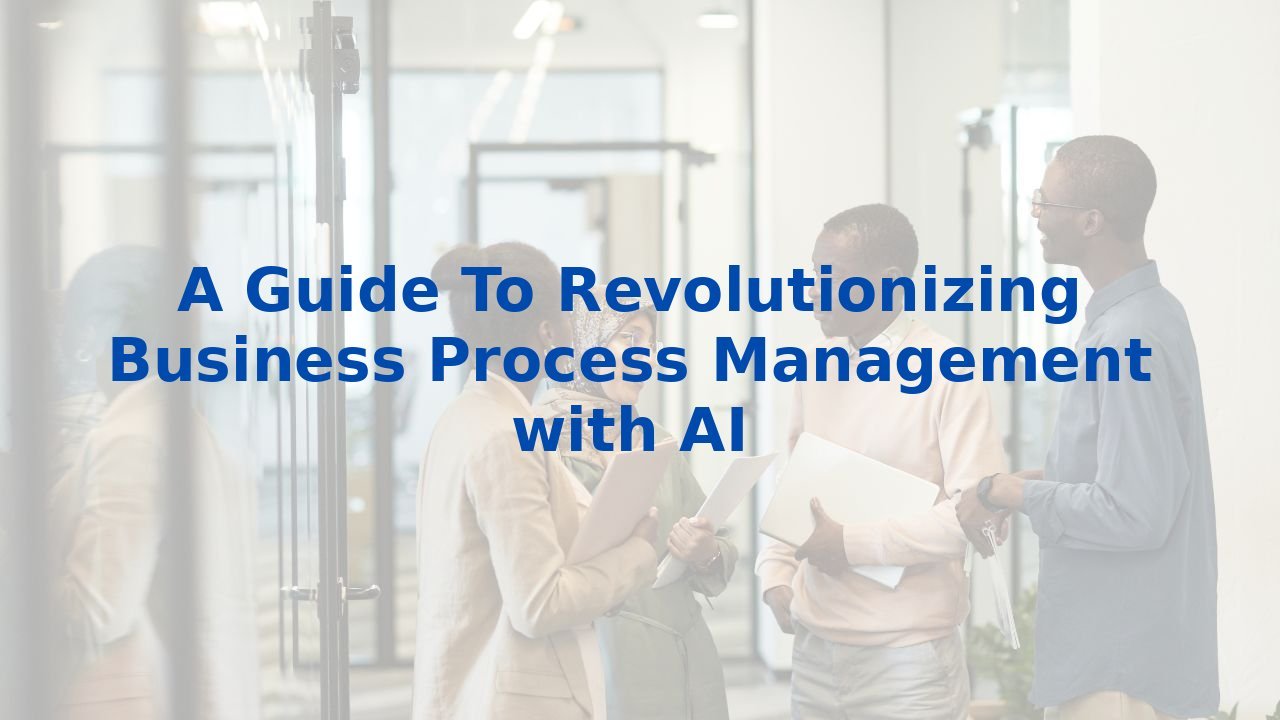A Guide To Revolutionizing Business Process Management with AI
A Guide To Revolutionizing Business Process Management with AI
In the ever-evolving landscape of business, achieving operational efficiency is non-negotiable. As organizations strive for effectiveness, they often find themselves at a crossroads where traditional methods meet cutting-edge technology. Here lies the transformative power of artificial intelligence (AI) in Business Process Management (BPM). This guide will explore how AI enhances business processes, the significant benefits of incorporating AI into operations, and the importance of equipping your workforce with the necessary skills to leverage AI effectively.
Enhancing Business Processes with AI
Data Analysis and Process Building
At the heart of BPM lies data—an invaluable resource. AI excels in analyzing extensive datasets, unveiling trends, predicting outcomes, and pinpointing inefficiencies. This capability dramatically enhances operational efficiency by facilitating informed decision-making. When businesses leverage AI for data analysis, they can establish streamlined processes that are both effective and agile, leading to better tactical and strategic decisions.
Process Automation
One of the game-changing aspects of AI in BPM is its ability to automate repetitive and time-consuming tasks. Imagine a scenario where mundane duties, such as document handling or lead scoring, are taken off your team’s hands. This automation does not just lighten the load; it allows human resources to channel their energy into strategic initiatives that truly drive growth and innovation. In an age where creativity and strategic thinking are paramount, freeing up time from manual tasks becomes a distinct advantage.
Real-Time Monitoring and Optimization
The benefits of AI don’t stop at automation. AI-powered tools can monitor processes in real-time, identifying deviations and potential roadblocks as they occur. Imagine the ability to detect delays or unusual activities before they escalate into significant issues. This level of proactivity is crucial; it ensures that processes are not just efficient but continuously improving, paving the way for agility and responsiveness in an ever-changing market.
Benefits of AI in Business Process Management
Improved Efficiency
The infusion of AI into BPM leads to remarkable efficiency gains.
- Automated Tasks: AI liberates teams from mundane responsibilities, elevating overall productivity and minimizing error rates.
- Enhanced Decision-Making: With predictive analytics, businesses can make decisions backed by data trends and behavior patterns, ultimately leading to optimized processes and better resource use.
Enhanced Customer Experience
The modern consumer craves personalization and immediacy, both of which can be significantly amplified through AI.
- Personalized Services: By analyzing individual customer data, AI can help craft tailored experiences, enhancing satisfaction and loyalty.
- Real-Time Support: AI chatbots can provide immediate assistance, ensuring customers are heard and helped without overwhelming human representatives.
Cost Reduction
In the pursuit of profitability, AI shows its mettle.
- Reduced Labor Costs: Automating routine tasks can lead to substantial reductions in labor costs, particularly in labor-intensive industries.
- Improved Resource Allocation: With the power of analytics, AI identifies areas where resources can be optimized, eliminating waste and enhancing overall operational efficiency.
The Importance of Training Employees for AI
Despite the remarkable capabilities of AI, the technology is only as effective as the people who wield it. Training employees is crucial for unlocking AI's full potential.
Understanding AI Capabilities
Recognizing both the possibilities and limitations of AI is vital in integrating it into daily workflows. A well-informed workforce can utilize AI tools to their fullest extent, amplifying productivity and creativity.
Data Interpretation
AI produces vast amounts of data; however, actionable insights depend on human interpretation. Investing in training ensures that employees can derive meaningful insights from AI-generated data, making the decision-making process genuinely data-driven.
Adaptability
The rapid pace of AI advancement means that continuous training is necessary. By fostering a culture of learning, organizations can ensure their teams are adaptable to new tools and techniques, maintaining a competitive edge.
Ethical Considerations
With great power comes great responsibility. AI's deployment raises ethical questions around data privacy and potential biases. Training must encompass these considerations, promoting a responsible and ethical approach to AI utilization.
Conclusion
AI is undeniably transforming business process management, from enhancing data analysis to automating processes, optimizing real-time monitoring, and sharpening decision-making. The benefits are vast: increased efficiency, elevated customer experience, and reduced costs. However, the journey does not stop at adoption. Equipping employees with the necessary training is essential to harness AI's full potential, ensuring that organizations are not only relevant but leaders in their fields. The future is not just about technology; it's about the people behind it, empowered to innovate and drive change.
For organizations eager to embark on this journey, consider investing in comprehensive training solutions that equip your workforce with essential AI skills. Embrace the revolution; the future of business is here to be shaped.



